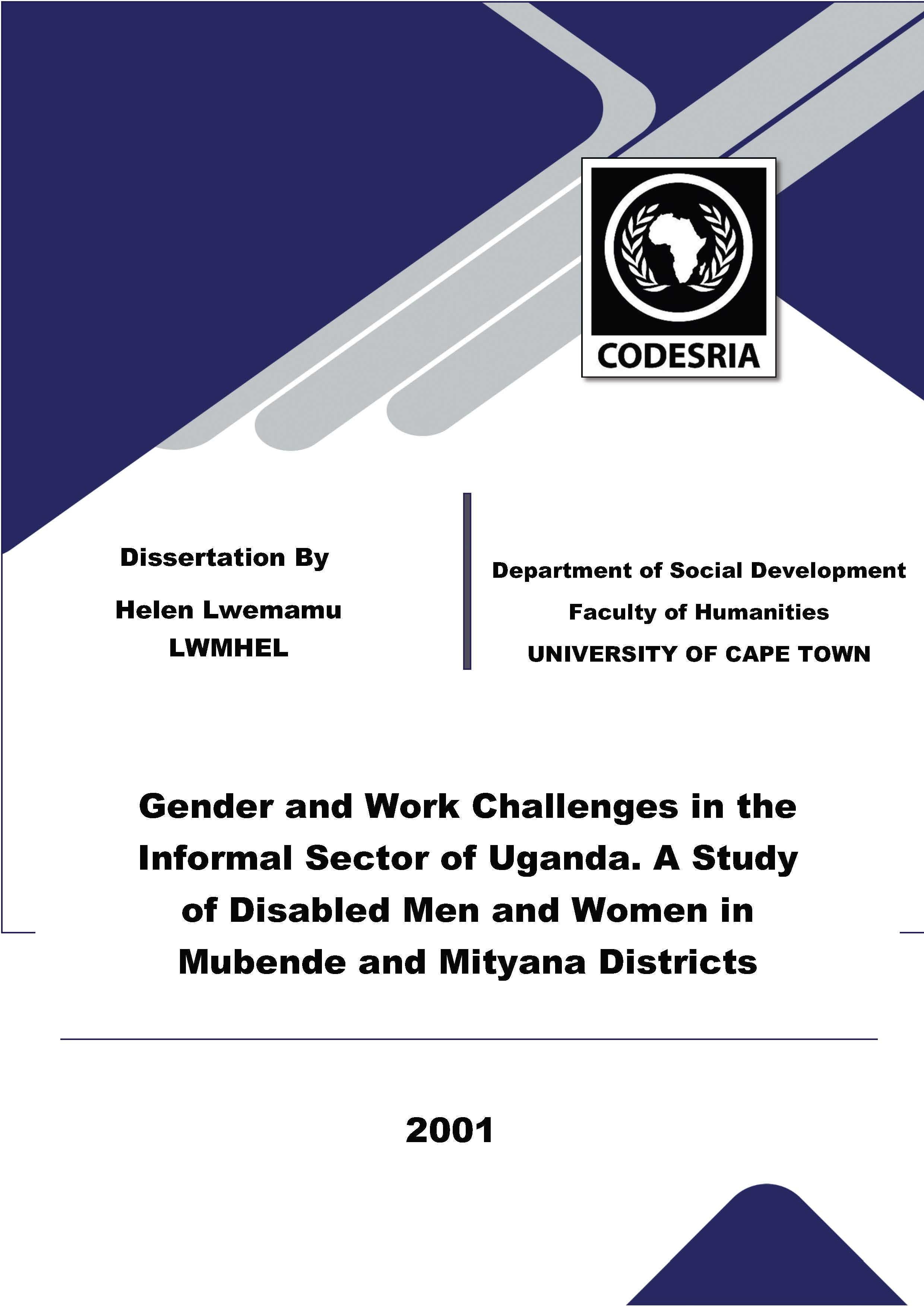Gender and Work Challenges in the Informal Sector of Uganda. A Study of Disabled Men and Women in Mubende and Mityana Districts
Keywords:
Informal Sector, Uganda, MityanaSynopsis
Compared to disciplines like gender and health, fewer studies have been done on disabled men and women's participation in the informal sector. This may be explained by the fact that for a long time, few disabled men and women in Uganda engaged or participated openly in income generating activities (IGAs). Many started getting involved in the 1990’s and as the available literature shows, those who have done so are very enthusiastic and this has encouraged others. This study focuses on the gender and work challenges disabled men and women encounter in the informal sector of Uganda. The study is based on a review of existing literature and actual fieldwork carried out in the Mubende and Mityana districts of Uganda. It seeks to: (a) explore the types of business activities in which disabled men and women are engaged; (b) explore the nature of work challenges disabled men and women encounter in the informal sector and the nature of strategies they utilize to overcome these challenges; (c) ascertain the benefits that disabled men and women have gained in respect of participation in the informal sector; (d) establish the policies and laws that govern disabled men and women with regard to their work in the
informal sector; and (e) establish how resources are allocated by various governmental and nongovernmentalOrganisations among disabled men and women in Mubende and Mityana districts.
Downloads
References
Abu-Habib, l. 1997. Gender and disability: women's experiences in the Middle East. Oxford: Oxfam.
Albu, M. 2005. Economic empowerment of disabled people: lessons from northern Uganda about developing the market for enterprise-based skills development services. Sussex.
Action for Disability and Development (ADD). 2001. Guidelines for disability and development in the communities volunteer workers. Kampala.
Action for Disability and Development (ADD). 2004. Kampala.
Albert, B., Mcbride, R. & Seddon, D. 2002, September. Perspectives on disability, poverty & technology. A report to healthlink worldwide. University of East Anglia. Norwich.
Ansari, N. B. 2001. Data quality control. Karachi. [Online]. Available: http://www.publichealth.pitt.edu/supercourse/SupercoursePPT/7011-8001/274,1,DataQualityControl. [2006,June 11].
Asindua, S. 2002. What is CBR in an African context. In CBR: A participatory strategy in Africa. S. Hartley, Ed. London: University College London, Centre for International child health. 26-36.
Babbie, E. & Mouton, J. 1998. The practice of social research. Oxford: Oxford University Press.
Baliddawa, B. 2003. Bridging the gap between men and women in development.
Barnes, C. & Mercer, G. 1995. Disabled people and community participation. In Community participation and empowerment. G, Craig. & M. Mayo, Eds. London: Zed books.
Barron, K. 1997. The bumpy road to womanhood. Disability and Society. Routledge. 12(2): 223-240
Becker, K. F. 2004. The informal economy. [Online]. Available: http://rru.worldbank.org/Documents/PapersLinks/Sid a.pdf [2006, July 23].
Beresford, P. 1996. Challenging dominant debates and policies. Disability and society: Poverty and disabled people. 11(4): pp. 553 – 568.
Bigsten, A., Kimuyu, P. & Lundval. K. 2004. What to do with the informal sector. Development Policy Review. Nairobi . 22 (6): pp. 701-715
Brunetti, A. Kisunko, G & Weber, B. 1997. Institutions in Transition: reliability of rules and economic performance in former socialist countries. The World Bank Policy Research Working Paper Series 1809.
Brunhns, B., Murray, A., Nuukuawot, T. & Kanguehi, T. 1995. Disability and rehabilitation in Namibia. A national survey. NEPRU research report No. 9. Windhoek: The Namibian economic policy research unit.
Burns, K. 2002. Sexuality education in a girls / school in Eastern Uganda. Agenda 53: 81-88.
Hales, G. 1996. Beyond disability. Towards an enabling society. New Delhi: SAGE.
Hamaguchi, P. M. 2001. Childhood speech, language & listening problems: what every parent should know.2nd ed. New York: John Wiley & Sons, Inc.
Hans, A. & Patri, A. Eds. 2003. Women, disability and identity. New Delhi: SAGE.
Hanson, N. 2002. The geography of disabled women and work: Paper given at the new directions in disability seminar series, Centre for Disability Studies, University of Leeds, Leeds. 10 April 2003. [Online]. Available: http://www.leeds.ac.uk/disability-studies/archiveuk/Hanson/On%20Approval.pdf. 20 September 2007.
Hartley, J. Case Studies in organisational research in Symons, C and Cassel, C (eds). 1994. Qualitative methods in organisational research: A practical guide. London: SAGE.
Hartley, S., Nganwa, A. & Kisanji, J. 2001. Professionals’ participation in CBR programmes. In CBR: A participatory strategy in Africa. S. Hartley. Ed. [Online]. Available: http://www.asksource.info/cbr-hartley.htm. [2007, March 20]
Hartley, S. & Ojwang, V. 2000. Community Based Rehabilitation training in Uganda: an overview in Community-Based Rehabilitation (CBR) as a participatory strategy in Africa. Cornell University.
Hastings, E. 1998, September 12. Burning issues for people with disabilities. Paper presented at the annual general meeting of Women With Disabilities Australia (WWDA). Melbourne. In. Violence against Women With rview of the Literature. Howe, K. 2000. [Online]. Available:http://www.wwda.org.au/keran.htm. 20 September 2007.






